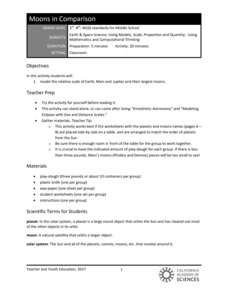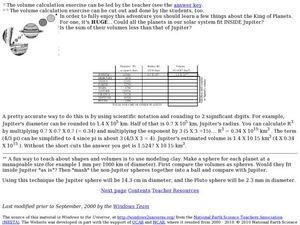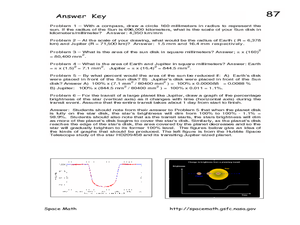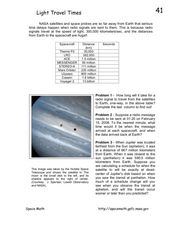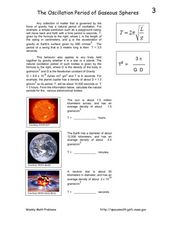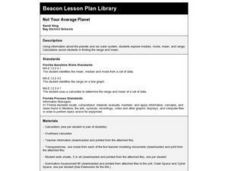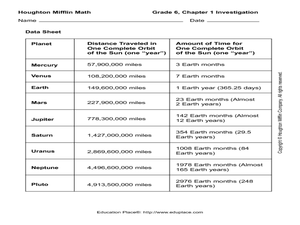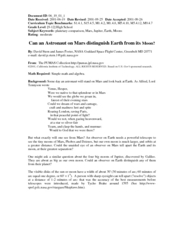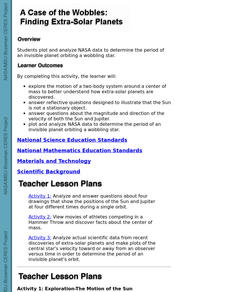Curated OER
On Jupiter
Middle schoolers tour Jupiter. In this scenario based lesson, students examine the size of Jupiter and make models of the other planets in the solar system to show how large Jupiter is compared to the other planets.
California Academy of Science
Moons in Comparison
Just how big is Earth's moon? With a hands-on simulation, scholars use Play-Doh to model the sizes of the planets Earth, Mars, Jupiter, and their moons. They make predictions as a class, work together to make their models, and discuss...
Curated OER
Email From Another Planet
In this article about emails and plants worksheet, students read short descriptions about 8 planets in the solar system and then imagine they are visiting one of the planets and send an email to a family member describing their...
Voyage Solar System
Round and Round We Go — Exploring Orbits in the Solar System
Math and science come together in this cross-curricular astronomy lesson plan on planetary motion. Starting off with a hands-on activity that engages the class in exploring the geometry of circles and ellipses, this lesson...
Curated OER
Water on Planetary Surfaces
In this water on planetary surfaces worksheet, students read about the Galileo spacecraft and the surface of Jupiter's moon Europa. They read about the energy needed to keep the water in a liquid state on Europa. Students solve 4...
Curated OER
Organic Molecules Detected on Distant Planet!
Here is a planet worksheet in which learners read about organic molecules detected through spectral lines of the planet Osiris. They calculate the mass, the volume and the densities of common ingredients for planets including Osiris and...
Curated OER
How To Build a Planet From The Inside Out!
High schoolers read about the Spitzer Space Telescope and the technology used to learn about planet composition. They calculate the radius of a planet, the size of a planet, the average density of a planet and the likely core composition...
Curated OER
Planet Structure & Interior
Students compare Jupiter and Earth. In this Earth and space studies instructional activity, students compare the composition of Earth and Jupiter and analyze how the composition affects the rate at which the planets spin.
Curated OER
Volume Calculation Exercise
Middle schoolers work with scientific notation and rounding as they determine volume. In this volume instructional activity, pupils attempt to calculate the volume of the planet Jupiter. They use rounding to two significant digits and...
Curated OER
Planet Fractions and Scales
In this planets and fractions worksheet, students solve nine problems about the sizes and scales of planets compared to each other using fractions.
Curated OER
Coronal Mass Ejection
For this coronal mass ejection worksheet, students read about the coronal mass ejections detected by the IMAGE satellite and the Hubble Space Telescope resulting in auroras. Students solve 6 problems and determine the speed of the...
Curated OER
Kepler-The Hunt for Earth-like Planets
In this hunt for planets worksheet, students read about the Kepler satellite used to detect exoplanets. Students solve 6 problems including drawing a sun disk and determining the scale in kilometers/millimeter, finding the area of the...
Curated OER
Light Travel Times
In this travel time of light learning exercise, students read about the NASA satellites and space probes that transmit radio signals at the speed of light across huge distances. Students solve 3 problems about data transmission from...
Curated OER
The Oscillation Period of Gaseous Spheres
For this oscillation period worksheet, students read about how the force of gravity effects the oscillation of bodies. Students use two given formulas to identify the oscillation period of the sun, the Earth and a neutron star.
Curated OER
Not Your Average Planet
Fourth graders explore median, mode, mean, and range using information about the planets and our solar system.
Curated OER
A Matter of Timing
In this orbital period learning exercise, students solve 2 problems about satellites and their orbits. They determine how many days it takes for two satellites to be in "opposition", they find the least common factor between their orbit...
Curated OER
Grade 6 Math Investigation
In this math investigation worksheet, students find five facts about outer space that contain a number greater then ten million, underlining the digit in the ten millions place. Worksheet has a chart with facts beyond the 10 million place.
Curated OER
Moons
Students practice rote counting to 20. After a lecture about the planets and the moons that surround them, they identify the number of moons surrounding various planets. Students compare and contrast the quantity of moons surrounding...
Curated OER
A Model Solar System
If Earth is modeled by a grapefruit, what planet could be represented by a golf ball? This activity uses everyday and not-so-everyday objects to create a model of the Solar System.
Curated OER
The Io Plasma Torus
In this plasma torus instructional activity, students solve 5 problems including finding the dimensions of the Io torus, determining the formula for the volume of a torus, finding the actual volume of the Ion torus and finding the amount...
Curated OER
Can an Astronaut on Mars Distinguish Earth from its Moon?
Learners explore the possibility of being on Mars and being able to identify the Earth. In this space lesson students complete a set of calculations to see if this is possible.
Curated OER
How Fast Does the Sun Spin?
In this rotation of celestial bodies worksheet, students determine the speed of the sun's rotation and they determine the number of days it takes the sun to rotate once at the equator. They identify the geometric factor that causes...
Curated OER
Finding Extra-Solar Planets
Students plot and analyze NASA data to determine the period of an invisible planet orbiting a wobbling star. They explore the motion of a two-body system around a center of mass to better explain how extra-solar planets are discovered.
Curated OER
Large Numbers- the Planets
For this writing distances worksheet, students re-write the chart to show the distance each planet sits from the sun using words rather than numbers, all measurements are in km.

